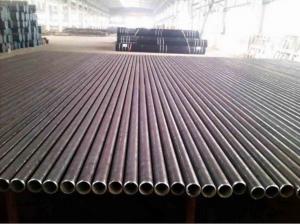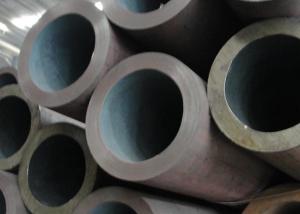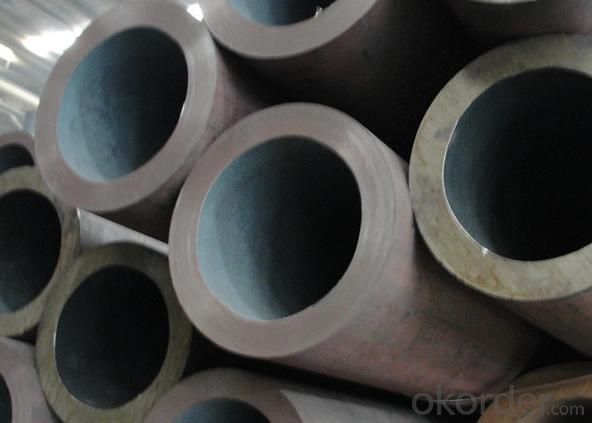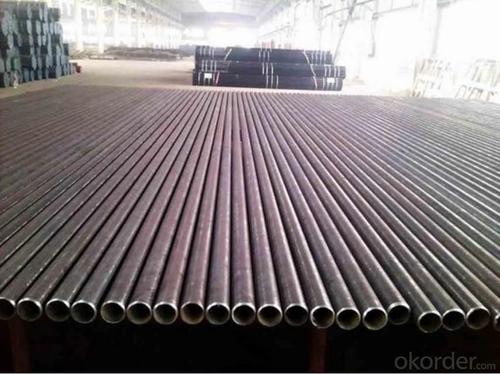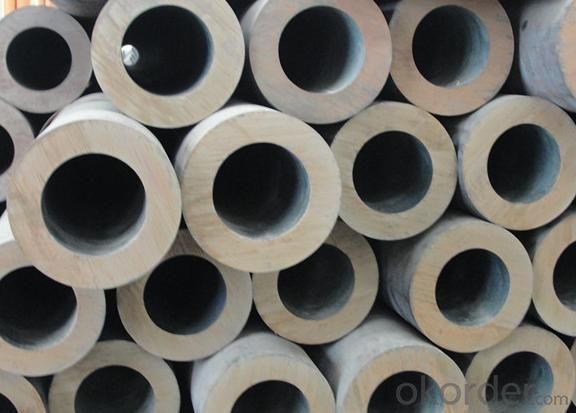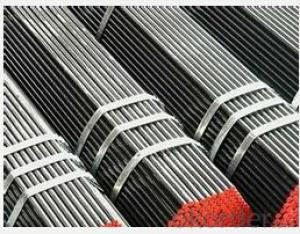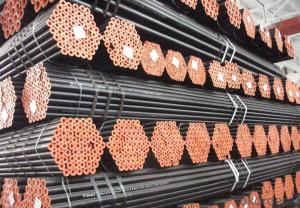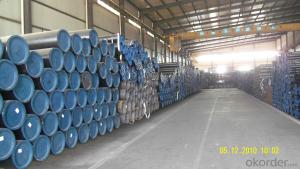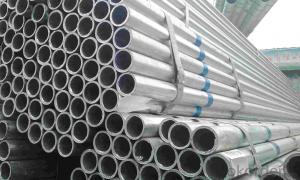Seamless Steel Tubes For High-pressure For Chemical Fertilizar Equipments
- Loading Port:
- China Main Port
- Payment Terms:
- TT or LC
- Min Order Qty:
- 50mt m.t.
- Supply Capability:
- 5000 Tons Per Month m.t./month
OKorder Service Pledge
OKorder Financial Service
You Might Also Like
Specifications of Seamless Steel Tubes For High-pressure For Chemical Fertilizar Equipments
1)superior in quality
2) quick in delivery
3) OD:8-720mm WT:3-60mm
4) Material:10# 20#,304 Q235 Q235B
high-pressure seamless steel tubes for chemical fertilizer equipments
Size OD: 3-60mm
WT: 8-720MM
Standard of Seamless Steel Tubes For High-pressure For Chemical Fertilizar
Standard: GB/T8162 GB3087 BGZJ518-2006 GB/T8163
Grade : 20#,304 Q235 Q235B Q235C Q235D and so on
End : BE and Plain end with pipe caps
Technique :Cold rolled, hot rolled, cold drawn
Usage of Seamless Steel Tubes For High-pressure For Chemical Fertilizar
Usage to industrial pipe, high-pressure boiler pipe,and food industry
Payment of Seamless Steel Tubes For High-pressure For Chemical Fertilizar
TT and irrevocable L/C
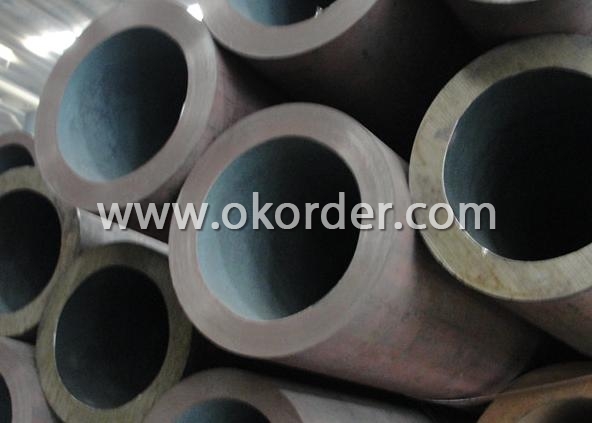
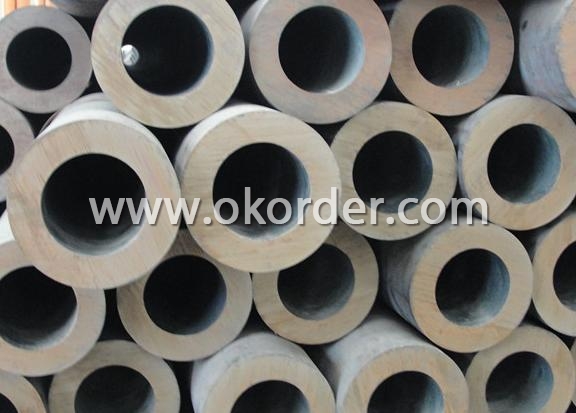
- Q: How are steel pipes used in the infrastructure development?
- Steel pipes are widely used in infrastructure development for various purposes. They are commonly used for transporting water, oil, and gas, as well as for drainage systems and sewage networks. Steel pipes are also used in the construction of bridges, buildings, and highways, providing structural support and stability. Additionally, steel pipes are utilized in underground utilities, such as telecommunications and electrical systems. Their durability, strength, and resistance to corrosion make steel pipes a crucial component in infrastructure development.
- Q: What material is RHS in the steel tube?
- The CHS structure represents thin-walled round steel tubes, in which materials are referred to Taiwan CHS's steel and are used to indicate the series of anti rust paints used in metal materials.
- Q: How are steel pipes used in the manufacturing of scaffolding?
- Steel pipes are commonly used in the manufacturing of scaffolding as they provide a strong and durable framework. They are used to create the main structure of the scaffolding, providing support and stability for workers and materials. The pipes are typically joined together using fittings, allowing for easy assembly and disassembly of the scaffolding system. Additionally, steel pipes can be easily adjusted to different heights and configurations, making them a versatile choice for scaffolding construction.
- Q: Can steel pipes be used for underground water lines?
- Yes, steel pipes can be used for underground water lines.
- Q: Could you tell me what difference between SC galvanized steel pipe and MT wire pipe?
- SC galvanized steel pipe, its pipe wall thickness, generally 20 steel pipe in 2.2-2.8mm. Also, we often refer to tap water galvanized steel pipe.MT wire pipe, its pipe wall is thin, generally 20 steel pipe in 1.5-2.2mm.
- Q: What is the difference between steel pipes and copper pipes?
- Steel pipes and copper pipes differ in terms of their material composition, with steel pipes being made of steel and copper pipes being made of copper. Steel pipes are generally stronger and more durable, making them suitable for high-pressure applications and underground installations. Copper pipes, on the other hand, have excellent heat conductivity and corrosion resistance, making them ideal for plumbing and heating systems. Additionally, copper pipes are more expensive than steel pipes but offer better resistance to bacteria growth. Ultimately, the choice between steel and copper pipes depends on the specific needs and requirements of the application.
- Q: How do you calculate the pressure drop in a steel pipe?
- To calculate the pressure drop in a steel pipe, you need to consider factors such as the pipe diameter, length, flow rate, and fluid properties. The pressure drop can be determined using various formulas, such as the Darcy-Weisbach equation or the Hazen-Williams equation, depending on the specific conditions and assumptions made. These equations take into account factors like pipe roughness, viscosity, and Reynolds number to determine the pressure drop across the pipe.
- Q: How are steel pipes used in the construction of water supply systems?
- Steel pipes are commonly used in the construction of water supply systems due to their durability and strength. They are often used to transport water from the source to treatment plants, as well as for distribution to homes and businesses. Steel pipes are resistant to corrosion, which ensures the quality of the water and the longevity of the system. Additionally, their high pressure-bearing capacity makes them suitable for water supply networks that require efficient and reliable transportation of water.
- Q: Can steel pipes be used for geothermal systems?
- Yes, steel pipes can be used for geothermal systems. Steel pipes are commonly used in geothermal systems for their high strength, durability, and ability to withstand high temperatures and pressures. They are also resistant to corrosion, making them suitable for long-term use in geothermal applications.
- Q: How are steel pipes protected against electromagnetic interference?
- Steel pipes can be protected against electromagnetic interference by applying a layer of insulating material around the pipes or by utilizing electromagnetic shielding techniques such as wrapping the pipes with conductive materials. Additionally, grounding the pipes and implementing proper grounding practices can help minimize the impact of electromagnetic interference.
1. Manufacturer Overview
| Location | Wuxi, China |
| Year Established | 1991 |
| Annual Output Value | 300,000Tons |
| Main Markets | Europe; Southeast Asia; etc. |
| Company Certifications | API 5L;API 5CT;API Q1;ISO/TS29001 |
2. Manufacturer Certificates
| a) Certification Name | |
| Range | |
| Reference | |
| Validity Period |
3. Manufacturer Capability
| a) Trade Capacity | |
| Nearest Port | Wuxi; Shanghai |
| Export Percentage | 41% - 50% |
| No.of Employees in Trade Department | 3900-4000 People |
| Language Spoken: | English; Chinese; Spanish |
| b) Factory Information | |
| Factory Size: | Above 450,000 square meters |
| No. of Production Lines | Above 10 |
| Contract Manufacturing | OEM Service Offered;Design Service Offered |
| Product Price Range | Average |
Send your message to us
Seamless Steel Tubes For High-pressure For Chemical Fertilizar Equipments
- Loading Port:
- China Main Port
- Payment Terms:
- TT or LC
- Min Order Qty:
- 50mt m.t.
- Supply Capability:
- 5000 Tons Per Month m.t./month
OKorder Service Pledge
OKorder Financial Service
Similar products
Hot products
Hot Searches
Related keywords
